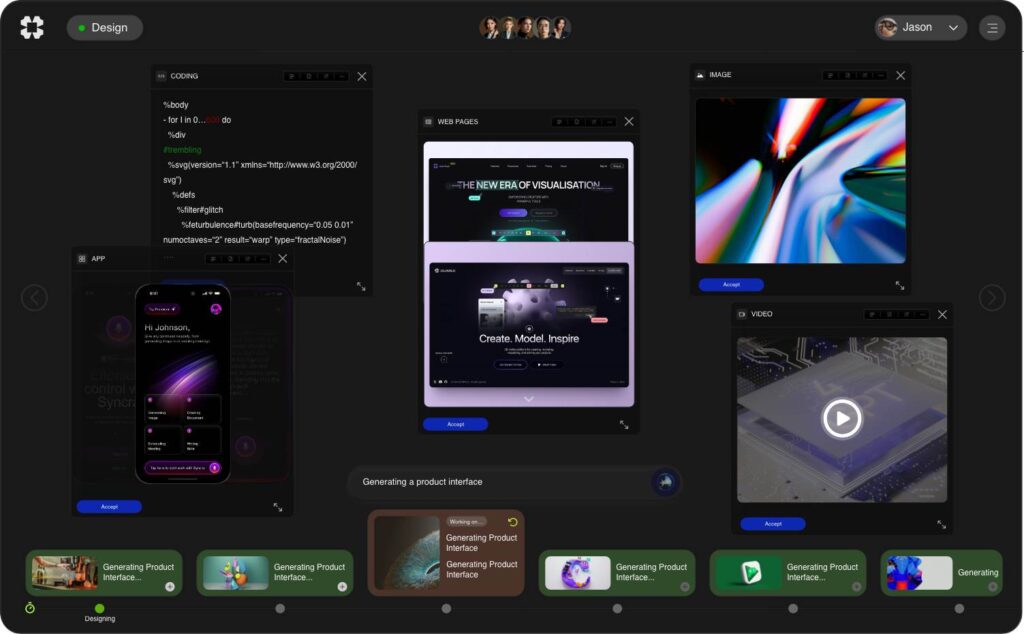In the fast-paced world of business, organizations continually seek innovative approaches to enhance their operational efficiency and productivity. One of the most transformative trends shaping the future of industries is the integration of Artificial Intelligence (AI) into operations. From streamlining processes to optimizing workforce management and improving decision-making, AI stands to revolutionize the way companies function. This article delves into the latest updates, trends, and applications of AI in operations, particularly focusing on productivity improvements and AI-based data management solutions.
.
**Understanding AI in Operations: A Game Changer for Businesses**
AI in operations refers to the deployment of machine learning, automation, and analytics to enhance business processes. As per a report by McKinsey, organizations that adopt AI technologies can expect an increase of up to 30% in their operational efficiency. This boost is realized through the automation of repetitive tasks, predictive analytics for better forecasting, and intelligent systems that facilitate real-time decision-making.
For example, robotic process automation (RPA) can efficiently handle mundane tasks within finance, HR, and customer service departments. By offloading these tasks to AI, organizations free up human resources to focus on higher-value activities that require creativity and strategic thinking. As organizations continue to integrate AI into their operations, the overall productivity of teams is witnessing an unprecedented surge.
.
**AI Productivity: Amplifying Human Potential**
The conversation around AI productivity has gained momentum, especially given the global shift toward remote work environments. AI tools are increasingly being utilized to bolster communication, collaboration, and project management. Technologies like AI-driven chatbots facilitate real-time communication with customers and team members, enhancing engagement and streamlining workflows.
Additionally, AI algorithms can analyze workflows and suggest optimal task assignments based on employee performance data. For instance, platforms like Asana and Trello are beginning to incorporate AI capabilities that recognize team dynamics and productivity patterns, ensuring teams are well-aligned to meet project goals.
Notably, a study by Boston Consulting Group revealed that organizations leveraging AI in workforce management noted a 20% increase in employee productivity within the first year of implementation. This leap in productivity can be attributed to reduced burnout rates, as AI takes over mundane tasks, allowing employees to invest their time in more fulfilling and impactful work.
.
**AI-based Data Management Solutions: The Backbone of Operations**
AI-based data management solutions are critical for organizations navigating the complexities of data in today’s digital landscape. With the vast amount of data generated daily, effective data management is imperative for decision-making. AI tools can facilitate this by automating data collection, cleaning, and analysis, thus improving data integrity and speed.
Solutions such as cloud-based data warehouses leverage AI to process data more efficiently. For instance, platforms like Snowflake and Google BigQuery utilize machine learning algorithms to perform dynamic data integration, allowing organizations to derive insights swiftly and effectively. These capabilities significantly reduce the time spent on data management tasks, enabling teams to focus more on analyzing data trends and making informed decisions.
Moreover, AI powers advanced analytics techniques such as predictive analytics. Organizations can now anticipate market trends, customer behavior, and operational bottlenecks by processing historical data through sophisticated AI models. This foresight enables proactive management strategies, paving the way for enhanced agility and competitiveness.
.
**Technical Insights: The Technology Behind AI in Operations**
Understanding the technical underpinnings of AI solutions in operations is essential for businesses looking to adopt these technologies. At the core of AI-driven solutions are machine learning algorithms, which learn from data patterns to make predictions and decisions. Various machine learning approaches include supervised and unsupervised learning, reinforcement learning, and deep learning.
Supervised learning algorithms depend on labeled datasets to learn relationships between variables. They are widely used for predictive analytics tasks, such as demand forecasting and customer segmentation. Unsupervised learning, on the other hand, is employed to identify hidden patterns in data without prior labels, useful in clustering and anomaly detection.
AI frameworks such as TensorFlow and PyTorch allow organizations to develop custom machine learning models tailored to their specific operational challenges. Furthermore, natural language processing (NLP) technologies empower businesses to leverage unstructured data—such as customer feedback and social media interactions—to gain actionable insights.
Integration of AI solutions into existing IT infrastructures requires careful consideration of data architecture and privacy regulations. Organizations need to ensure compliance with regulations such as GDPR while also safeguarding sensitive business data.
.
**Industry Use Cases: AI in Action Across Sectors**
Various industries are exemplifying the effective use of AI in operations, each demonstrating unique applications that enhance productivity and data management.
1. **Manufacturing:** In manufacturing, AI-powered predictive maintenance proactively predicts equipment failures, thereby reducing downtime and maintenance costs. Companies like Siemens and GE utilize AI algorithms to analyze sensor data from machines and notify staff of potential issues before they escalate.
2. **Retail:** Retailers are using AI for inventory management by predicting stock levels required based on historical sales data. Amazon, for instance, employs AI-driven algorithms to optimize inventory turnover, ensuring products are available for customers while minimizing excess stock.
3. **Healthcare:** In healthcare, AI enhances patient care through predictive analytics, helping identify patients at risk of certain conditions by analyzing historical health records and lifestyle data. Companies like IBM Watson Health utilize AI-powered analytics to assist healthcare professionals in diagnosing diseases more accurately.
4. **Finance:** Financial institutions deploy AI for fraud detection by analyzing transaction patterns to identify anomalies. Machine learning models can adapt to new fraud techniques, continuously learning from data to improve detection accuracy. PayPal and Mastercard have invested heavily in AI technologies to protect transactions and enhance security.
5. **Logistics:** AI solutions in logistics optimize route planning and fleet management. Companies like UPS and DHL utilize AI algorithms to analyze traffic patterns, predict delivery times, and reduce operational costs associated with fuel consumption and labor.
.
**Conclusion: Embracing the AI Revolution in Operations**
As organizations continue to adapt to the rapid technological landscape, embracing AI in operations is no longer an option but a necessity. AI’s potential to drive productivity through automation, enhance data management, and empower decision-making is proving to be invaluable.
The shift to AI-driven operations allows companies to gain a competitive edge, improve employee satisfaction, and respond quickly to market changes. As advancements in AI technologies continue to unfold, businesses must remain agile, ready to leverage AI solutions tailored to their unique operational challenges and industry requirements.
In summary, those willing to invest in AI in operations are not just enhancing their productivity—they are setting themselves up for long-term success in a digital world poised for transformation.
.
**Sources:**
1. McKinsey & Company (2023). “The State of AI in Business.”
2. Boston Consulting Group (2023). “How Artificial Intelligence is Reshaping Work.”
3. Snowflake (2023). “Architecting a Data Warehouse for AI.”
4. IBM Watson Health (2023). “AI in Healthcare: Enhancing Patient Care.”
5. UPS (2023). “How AI is Transforming Logistics Operations.”

























